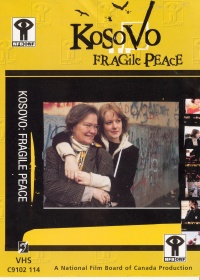| ________________
CM . . .
. Volume XI Number 18 . . . .May 13, 2005
excerpt:
The above description of the tape's contents gives an accurate introduction to the intention of Kosovo: Fragile Peace. While dealing with Kosovo, however, it also tells the viewer quite a bit about Carolyn McCool and what motivates her to try and bring democracy to such a troubled part of the Balkans. She seems to be a worthy successor to Canadian leaders such as Lester B. Pearson who established high standards for Canadian diplomacy many years ago. The film is as much about McCool's personal journey as it is about the problems facing the people of Kosovo. Both aspects of the film grasp the viewer's attention and leave him/her with a desire to see a sequel. The film combines scenes of devastation from the war-ravaged areas of Kosovo with those of stunningly beautiful countryside. The camera's movement from one to the other makes the viewer wonder how such a beautiful place could become the scene of so much violence and tragedy. Most of the film is in colour, but some scenes are in black and white. The latter seem to be in the Serb areas of the province to emphasize the continuing ethnic tension. It was filmed prior to Kosovo's first democratic election and provides good coverage of election rallies with much of the excitement that usually comes with such events. Some background print material would have been helpful in understanding what happened in Kosovo. The film assumes a grasp of recent Balkan history many viewers may not have. For classroom use, background notes are very helpful. Without them, this film is like a window on Kosovo that is only partially opened. Without giving enough facts, it skims the surface of the ethnic tension that was responsible for the atrocities committed against the Albanians and later by the Albanians against the Serbs. Troops are shown, for example, but apart from the UN soldiers with blue berets, it is not clear if they are Serbs or Albanians. Kosovo: Fragile Peace raises many questions for which no answers are given. The most obvious are as follows:
The film provides plenty of scope for classroom discussions on racism and democracy and the compromises that must be made if the latter is to succeed. These compromises are dealt with quite well in the film. Students could also be asked to find answers to the above questions. They could even compare Kosovo's ethnic tensions with Canada's and its ongoing struggle to keep Quebec in Canada. Recommended. Thomas F. Chambers is a retired college teacher living in North Bay, ON.
To comment
on this title or this review, send mail to cm@umanitoba.ca.
Copyright © the Manitoba Library Association. Reproduction for personal
use is permitted only if this copyright notice is maintained. Any
other reproduction is prohibited without permission.
NEXT REVIEW |
TABLE OF CONTENTS FOR THIS ISSUE
- May 13, 2005.
AUTHORS |
TITLES |
MEDIA REVIEWS |
PROFILES |
BACK ISSUES |
SEARCH |
CMARCHIVE |
HOME |
